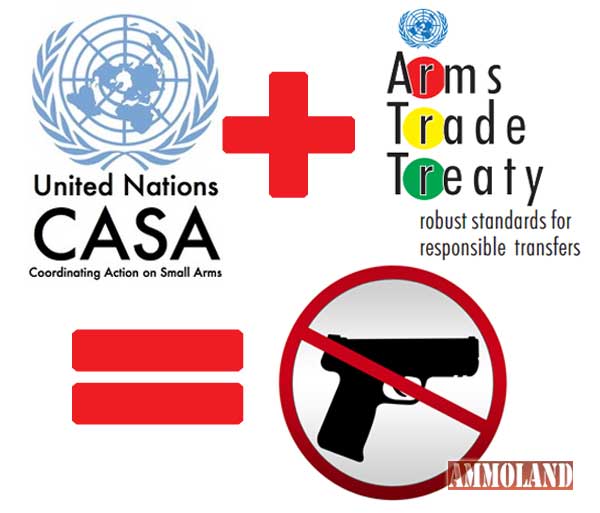

Geneva –-(Ammoland.com)- The Arms Trade Treaty (ATT) is recognized within the UN system as a gateway instrument for the progressive development of conventional arms control and disarmament.
A valuable input to this process will likely be the United Nations’ (UN) International Small Arms Control Standards (ISACS).
This draft paper examines the purpose, scope, approach, history, players, process, controversy, and selected normative implications of the UN’s ISACS project.
The paper makes use of various primary source documents including the initial ISACS project kick-off document, draft standards on national small arms control, and interviews and public statements from the ISACS project coordinator, a contracted lead-author, influential diplomats and legal scholars, and stakeholders from non-traditional civil society groups. The paper uses this material to review the execution of the ISACS project and its deliverables in light of its goal to produce internationally accepted and validated standards.
The review found evidence of the project being in systemic variance with two of the four basic principles of international standards development promoted by the International Organization of Standardization (ISO). The implication for ISACS project deliverables is mixed. While some States may choose to adopt them in whole or part into national legal systems, specially-affected states like the United States might not because the deliverables came from a process characterized by a favored stakeholder engagement approach and an opaque and exclusive governance model, are therefore not bona-fide standards a la the ISO method, and of questionable normative validity.
A key element of the paper is an explanation of how the ISACS project and some of its deliverables on national small arms control are an example of 21st century transnational gun control policy making.
The paper then illustrates how one draft standard in particular presents adverse implications for non-traditional segments of global civil society as represented by non-profit and charitable trade, collecting, sporting, and “pro-gun” human rights / civil rights groups in exceptional developed national jurisdictions, namely the United States. Among other things the paper reports feedback on how the execution of the project has seriously eroded confidence among these specially-affected non-traditional stakeholders who would have support the project’s admirable humanitarian aims.
The paper ends with the observation that, for all the good ISACS may do for normatively underdeveloped states, the ISACS project is instructive for its flaws to developers and advocates of international law. One lesson is perhaps that normative ambitions in UN project settings can and do compromise accepted principles of international standards development and undermine confidence among stakeholders, and that this can have predictable political consequences with potentially wide-ranging implications.
Ultimately, the apparent infidelity of the ISACS development process with respect to the ISO standards development principles, among other things, may create an enduring crisis of confidence that precipitates disruptive political blow-back that could reverse official American support for the ATT and undermine other efforts at conventional arms control and disarmament.
Download Paper here: https://tiny.cc/tfef0w
INTERNATIONAL SMALL ARMS CONTROL STANDARDS DEVELOPMENT by JMGenevaAcademy
- Original Posting: https://tsmworldwide.com/draft-paper-released-for-review-comment/
- The author is looking for feedback on this paper and can be contacted at: jeff.moran (at) geneva-academy.ch
About The Author
Jeff Moran lives in Geneva, Switzerland and is a consultant specializing in the ethical and responsible development of the international defense, security, and shooting sports industries at TSM Worldwide LLC. Previously Mr. Moran was a strategic marketing leader for a multi-billion dollar business unit of a public defense & aerospace company and an American military diplomat. He is currently studying weapons law within the Executive LL.M. Program of the Geneva Academy of International Humanitarian Law and Human Rights. Mr. Moran has an Executive Master in International Negotiations and Policymaking from the Graduate Institute of Geneva, an MBA from Emory University’s Goizueta Business School, and a BSFS from Georgetown University’s Walsh School of Foreign Service.
